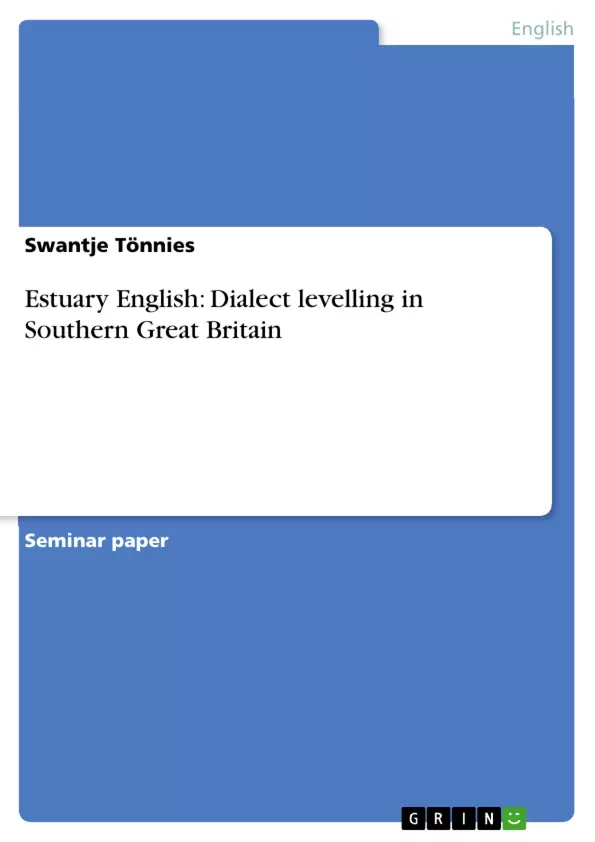Ever since David Rosewarne first coined the term of Estuary English in 1984, the concept of an evolving dialect that extends across regional and social boundaries has given rise to a heated debate between linguists, some of who predict that Estuary English is threatening to replace RP in its role as a national standard. Sharing phonemic characteristics with both RP and the Cockney dialect, Estuary English has, although regionally confined to the South East of England, become a variety of the English language that crosses borders between different age groups, professions and social backgrounds, and is even represented in the media. This paper shall contrast Estuary English with both Cockney and RP in sociolinguistic terms and on a phonemic level. Further goals are to identify historical and social factors that may explain the current linguistic development in Southern Britain, and finally, to summarize the debate between renowned linguists about whether or not a significant role should be assigned to Estuary English, the dialect somewhere “between Cockney and the Queen” (Rosewarne 1994/37: 3).
Table of Contents
- Introduction
- Reference Dialects
- Received Pronunciation (RP)
- Cockney/Popular London
- Estuary English (EE)
- Dialect, accent or degenerate speech?
- Regional extension of EE
- The Pronunciation of EE
- Consonants
- L-vocalisation
- Glottaling
- Affricatisation
- Yod-dropping
- Vowels
- Happy-tensing
- Minimal vowel changes
- Diphthongs
- Diphthongisation of RP vowels
- Diphthong and triphthong shifts from RP to EE
- Unadapted Cockney Features
- H-dropping
- Th-fronting
- Yod-dropping in initial position
- Hypercorrect/h/
- Consonants
- Conclusion
Objectives and Key Themes
This paper aims to contrast Estuary English with Cockney and Received Pronunciation (RP) in both sociolinguistic terms and on a phonemic level. It will also explore historical and social factors that may explain the current linguistic development in Southern Britain. Finally, the paper will summarize the ongoing debate among linguists regarding the significance of Estuary English as a developing dialect.
- The emergence and evolution of Estuary English as a distinct variety of English.
- The sociolinguistic characteristics of Estuary English, including its relationship to Cockney and RP.
- The phonetic features of Estuary English, including consonant and vowel changes.
- The historical and social factors that have contributed to the spread of Estuary English.
- The debate among linguists concerning the role and significance of Estuary English.
Chapter Summaries
The introduction establishes the context for the study by exploring the concept of Estuary English as an evolving dialect that transcends regional and social boundaries. It highlights the debate surrounding its potential to replace RP as a national standard.
Chapter 2 focuses on the two reference dialects, Received Pronunciation (RP) and Cockney. It examines the historical development and sociolinguistic significance of each variety, tracing their evolution from elitist and working-class accents to their current status in society.
Chapter 3 defines Estuary English and explores the question of whether it should be classified as a dialect or an accent. It discusses the features that distinguish Estuary English from RP and Cockney, including its pronunciation patterns, vocabulary, and grammatical structures.
Chapter 4 delves into the phonetic features of Estuary English, focusing on consonant and vowel changes. It compares the pronunciation of Estuary English to both RP and Cockney, highlighting the similarities and differences between these varieties.
Keywords
Estuary English, Received Pronunciation (RP), Cockney, dialect levelling, sociolinguistics, phonetics, regional variation, language change, social factors.
Frequently Asked Questions
What is Estuary English (EE)?
Estuary English is a dialect that emerged in the South East of England, described as being "between Cockney and the Queen's English (RP)." It shares features with both but has become a widespread variety across social classes.
How does Estuary English differ from Received Pronunciation (RP)?
Unlike the traditional, elitist RP, Estuary English includes features like L-vocalisation (pronouncing 'l' as a vowel) and glottaling (replacing 't' with a glottal stop in certain positions), making it sound more "modern" and less formal.
Is Estuary English replacing RP?
Linguists debate this. Some suggest EE is becoming the new "standard" for Southern Britain as it is widely used in media and business, while others see it merely as a regional accent extension.
What is "L-vocalisation" in Estuary English?
L-vocalisation is a key phonetic feature where the 'l' sound at the end of a word or before a consonant is pronounced like a 'u' or 'w' sound, for example, pronouncing "milk" as "miwk".
Does Estuary English use "H-dropping"?
Generally, no. H-dropping is a characteristic of the Cockney dialect. Estuary English speakers usually retain the 'h' sound at the beginning of words, which distinguishes them from pure Cockney speakers.
- Citar trabajo
- Swantje Tönnies (Autor), 2005, Estuary English: Dialect levelling in Southern Great Britain, Múnich, GRIN Verlag, https://www.grin.com/document/92534



